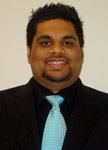Govind Minhas: What Mentoring Means to Me
By Mable Lo
 Govind Minhas, CHRP Candidate, is a recruiter for Staples Canada in the Western Region. His primary role is to recruit for managers in BC, Alberta, Saskatchewan, North West Territories and Yukon. Minhas is actively involved with BC HRMA and is in his second year of serving on the Greater Vancouver Advisory Council. One of Govind’s greatest achievements is contributing his time as a volunteer with the Vancouver Organizing Committee (VANOC) for the 2010 Olympic and Paralympic Winter Games. As a Team Lead, Govind oversaw the volunteer recruitment of 25,000 volunteers.
Govind Minhas, CHRP Candidate, is a recruiter for Staples Canada in the Western Region. His primary role is to recruit for managers in BC, Alberta, Saskatchewan, North West Territories and Yukon. Minhas is actively involved with BC HRMA and is in his second year of serving on the Greater Vancouver Advisory Council. One of Govind’s greatest achievements is contributing his time as a volunteer with the Vancouver Organizing Committee (VANOC) for the 2010 Olympic and Paralympic Winter Games. As a Team Lead, Govind oversaw the volunteer recruitment of 25,000 volunteers.
You are a very busy professional. What made you decide to volunteer your time as a mentor for the BC HRMA Professional Mentoring Program?
I am generally an individual that likes to help out others. I have guided individuals that are just entering the HR world, looking for the “big break”, so it reminds me the fact that I was in their shoes at one point too. At first, I didn’t have much guidance and help and it was tough to get established in the HR community. I think the Professional Mentoring Program is really beneficial in that way.
How would you describe your experience as a mentor?
It has been amazing! I am really thankful to Elizabeth Bonner who made me see the contributions that I could make in this program as a mentor. I’ve had great mentors the last couple of years and it really inspired and motivated me to be the best. I’m really looking forward to the upcoming year where I will likely be matched with a brand new mentor and a mentee.
Throughout your career, did you have any mentors? If so, how did they impact your professional growth?
Yes, I’ve always had mentors even outside the program. It was not as formal as the BC HRMA mentoring program but, ultimately, a great resource for me. Really, mentoring programs, such as the one put on by BC HRMA, is free consulting if you want to put it that way. I can rely on my mentors whenever the need comes up, I can always approach them for their ideas and thoughts on a certain situation. I have the knowledge portion of HR through school and other learning processes but my mentors in the past have given me the work-life perspective which has helped me adjust to a full-time position in the HR industry.
A mentor-mentee relationship is a two-way relationship. As a mentor, what did you learn or gain from your mentee?
I learned to be humble about the opportunities the mentee is seeking and to be as patient as much as possible. What is easy to you (myself) may not be easy to others therefore, you have to put yourself into their shoes and be respectful of their learning style and be as compromising as possible. For example, being able to rephrase an idea or providing different ways of analyzing certain concepts.
What are the three tips that you would give to this year’s mentors to foster a successful mentor-mentee relationship?
My first tip: be as compromising with the mentee as possible. It is essential to compromise when it comes to meeting the individual, the day, and times that you are going to meet per month is consistent, ensuring that you are maximizing the mentorship experience to its full potential.
My second tip: be open to receiving feedback just as much as giving it because that is essential for continuous improvement for a mentor and a mentee.
My last tip: once the mentorship program is complete after the six months, stay in touch with your mentee. For me personally, I had great satisfaction in seeing my mentee develop and improve from who they were at the beginning of this program. The goals of a mentee may not be accomplished during the six months but when that goal is accomplished, you know you’ve played a big part in the mentee’s achievements.
Applications for BC HRMA’s 2012 Professional Mentoring Program are accepted until October 15, 2011. Apply now!








